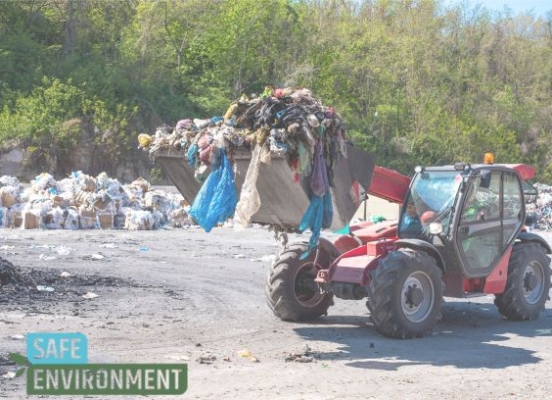Municipal Solid Waste Processing Technologies
Ambikapur, a lesser-known town in the Surguja district of Chhattisgarh, came to the limelight last year when it topped India’s Government conducted the Swacch Bharat survey. It effectively adopted new technologies to manage municipal solid waste and change the sanitation scenario positively.
Ambikapur now boasts of being the first to stop garbage landfills, to convert garbage to Gold (Money), and now it provides a full meal for anyone who brings one kg of plastic waste. Technology & local participation proved to a game-changer for this town.
This example of turning garbage into a resource is one of the few successful instances in our country. The sanitation scenario in the urban, peri-urban, and transition areas of the country is bleak. Garbage landfills, clogged drains, industrial waste & release of industrial effluents in the nearby rivers or Nala is a common sight. One can take the example of the Azadpur landfill site in Delhi, which has led to water pollution, foul air & unhygienic conditions in nearby areas. The pollution has led to substantial environmental & health costs for our country.
Therefore to make the municipalities of our countries hygienic & safe, effective municipal Solid Waste Processing Technologies need to be adopted. It has to be seen in this contest what the cities like Ambikapur did right. Thus, this write-up endeavor is to understand what is solid Waste in Municipal Areas & what technologies can be adopted to manage the solid waste-effectively.
In India, the Solid Waste Management Rules (2016) define Solid Waste as semi-solid domestic Waste, Sanitary Waste, Commercial Waste, Institutional Waste, Catering & Marketing Waste & other non-residential Waste, horticultural Waste, agriculture waste, etc.
Presently, our country produces 62 million tonnes of waste per year. Most of this waste consists of 0.17 million tonnes of biomedical waste, 1.5 million tonnes of e-waste, 5.6 million tonnes of plastic waste, and 7.90 million tonnes of hazardous waste.
India’s waste generation is likely to increase from 62 million tonnes to 165 million tonnes by 2030. Thus, India’s solid waste management challenge is overwhelming & it will probably increase because of the changing nature of waste. Therefore there’s an urgent need to adopt waste processing technologies.
Need for Municipal Solid Waste Processing technologies:
Technology can prove to be a boon for Municipal Solid Waste Management. Tremendous advances are happening in Solid waste processing technologies, whereby waste will become a resource by recycling and processing.
Various Solid waste processing technologies which can be adopted are:
A) Waste to Energy Technologies
- Incineration
- Gasification
- Pyrolysis
- Anaerobic digestion / Biomethanation
B) Composting
C) Vermin Composting
D) Production of Refuse Derived Fuel (RDR)
E) POLYCRACK
Most of the Municipal Solid Waste (MSW) processing technologies focus on energy recovery, whereby waste is used as fuel to generate electricity or heat. The electricity generation is by burning MSW by the process of incineration, Gasification, or Pyrolysis. Various burning techniques are adopted based on the nature of waste.
Another waste of energy technology that can be adopted is Bio-Methanation, which can process segregated waste (organic) to a local Bio-Methanation plan for anaerobic processing, thereby generating cooking gas.
Thirdly composting & vermin composting can also be adapted to process organic waste resulting in organic compost.
Another popular & emerging processing technology is Refuse-Derived-Fuel (RDF). RDF is Steam or Power generation that uses various combustible nonbiodegradable solid waste materials such as plastic, polythene, wood, commercial wastes & industrial wastes.
In recent years one promising emerging technology called POLYCRACK is making waves which are the world’s first patented heterogeneous catalytic process that converts multiple feed strokes into hydrocarbon liquid fuels, gas & carbon & water. Polytrack plant uses all types of plastic, petroleum, sludge, un-segregated MSWC Municipal Solid Waste with moisture up to 50% e-waste, automobile fluff, organic waste including bamboo, garden waste, etc. This technology has lots of advantages over Governmental Waste to energy approaches.
However, it would be wrong to say that the above waste to energy technologies is environmentally friendly. They do emit toxic gases as by-products & irresponsibly dispose of these dangerous by-products in the air. Thus such technologies have to be used with caution.
With concentrated efforts, we can bridge this massive gap between the waste generated and waste management in the country by various Municipal Solid Waste Processing Technologies mentioned above. Moreover, the recent focus on hygiene and sanitation globally & nationally has opened up a huge sector for the private sector/industry to provide know-how and technology.
In these times, when hygiene, sanitation, environment, fresh air, water are being considered essential as elements of the right to life, Solid Waste Management has become a crucial part of discussions and rhetorics. Moreover, the Solid Waste Management Rules of 2016 of India’s Government have made various aspects of waste management obligatory. Hence there is no moving away from waste management.
The industry should capitalize on the opportunity provided when we see energy conversion as a better substitute to landfills and dumping.
Therefore, in the coming 4-5 years, there will be a drastic change in India’s waste management sector. The success stories of Ambikapur would be more common. A massive campaign involving communities, NGOs, Industry, and other stakeholders is needed to push for better management of solid waste & adoption of technologies for the same.

